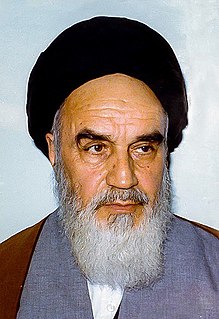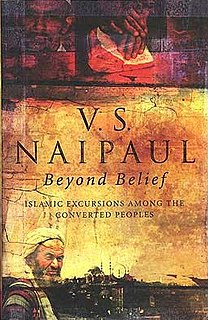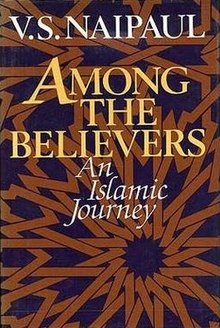
Sayyid Ruhollah Musavi Khomeini, also known as Ayatollah Khomeini, was an Iranian political and religious leader who served as the 1st supreme leader of Iran from 1979 until his death in 1989. He was the founder of the Islamic Republic of Iran and the leader of the 1979 Iranian Revolution, which saw the overthrow of Shah Mohammad Reza Pahlavi and the end of the Persian monarchy. Following the revolution, Khomeini became the country's first supreme leader, a position created in the constitution of the Islamic Republic as the highest-ranking political and religious authority of the nation, which he held until his death. Most of his period in power was taken up by the Iran–Iraq War of 1980–1988. He was succeeded by Ali Khamenei on 4 June 1989.
Ayatollah is an honorific title for high-ranking Twelver Shia clergy in Iran and Iraq that came into widespread usage in the 20th century.
War against Islam is a term used to describe a concerted effort to harm, weaken or annihilate the societal system of Islam, using military, economic, social and cultural means, or means invading and interfering in Islamic countries under the pretext of the war on terror, or using the media to create a negative stereotype about Islam. The perpetrators of the theory are thought to be non-Muslims, particularly the Western world and "false Muslims", allegedly in collusion with political actors in the Western world. While the contemporary narrative of the "War against Islam" mostly covers general issues of societal transformations in modernization and secularization as well as general issues of international power politics among modern states, the crusades are often narrated as its alleged starting point.

Grand Ayatollah Hussein-Ali Montazeri was an Iranian Shia Islamic theologian, Islamic democracy advocate, writer and human rights activist. He was one of the leaders of the Iranian Revolution and one of the highest-ranking authorities in Shīʿite Islam. He was once the designated successor to the revolution's Supreme Leader, Ayatollah Khomeini, but they had a falling-out in 1989 over government policies that Montazeri claimed infringed on people's freedom and denied them their rights. Montazeri spent his later years in Qom and remained politically influential in Iran, but was placed in house arrest in 1997 for questioning "the unaccountable rule exercised by the supreme leader", Ali Khamenei, who succeeded Khomeini in his stead. He was known as the most knowledgeable senior Islamic scholar in Iran and a grand marja of Shia Islam. Ayatollah Montazeri was said to be one of Khamenei's teachers.

Mohammed Sadeq Givi Khalkhali was an Iranian Shia cleric who is said to have "brought to his job as Chief Justice of the revolutionary courts a relish for summary execution" that earned him a reputation as Iran's "hanging judge". A farmer's son from Iranian Azeri origins was born in Givi, Azerbaijani S.S.R., U.S.S.R.. He is also reported to have born in Kivi, Khalkhal, in the Khalkhal County, Iran. Khalkhali has been described as "a small, rotund man with a pointed beard, kindly smile, and a high-pitched giggle."
There exist a number of perspectives on the relationship of Islam and democracy among Islamic political theorists, the general Muslim public, and Western authors.
An Islamic state is a state that has a form of government based on Islamic law (sharia). As a term, it has been used to describe various historical polities and theories of governance in the Islamic world. As a translation of the Arabic term dawlah islāmiyyah it refers to a modern notion associated with political Islam (Islamism).

Sayyid Mohammad Kazem Shariatmadari, also spelled Shariat-Madari, was an Iranian Grand Ayatollah of Azerbaijani Turkish origin. He favoured the traditional Shiite practice of keeping clerics away from governmental positions and was a critic of Supreme Leader Ruhollah Khomeini, denouncing the taking hostage of diplomats at the US embassy in Tehran. In 1982 he was accused of being part of a plot to bomb Khomeini's home and to overthrow the Islamic republic, and he remained under house arrest until his death in 1986. His followers also opposed Ruhollah Khomeini.

Velayat-e faqih, also known as Islamic Government, is a book by the Iranian Muslim cleric, faqīh, and revolutionary Ayatollah Ruhollah Khomeini, first published in 1970, and probably the most influential document written in modern times in support of theocratic rule.

Grand Ayatollah Naser Makarem Shirazi is an Iranian Shia marja' and religious leader.

In Xanadu: A Quest is a 1989 travel book by William Dalrymple.

The origin of Shia–Sunni relations can be traced back to a dispute over the succession to the Islamic prophet Muhammad as a caliph of the Islamic community. After the death of Muhammad in 632, a group of Muslims, who would come to be known as the Sunnis, believed that Muhammad's successor should be Abu Bakr, whereas a second group of Muslims, who would come to be known as the Shias, believed that his successor should have been Ali. This dispute spread across various parts of the Muslim world, which eventually led to the Battle of Jamal and Battle of Siffin. Sectarianism based on this historic dispute intensified greatly after the Battle of Karbala, in which Husayn ibn Ali and some of his close partisans, including members of his household, were killed by the ruling Umayyad Caliph Yazid I, and the outcry for revenge divided the early Islamic community, albeit disproportionately, into two groups, the Sunni and the Shia. This is known today as the Islamic schism.
Imaduddin is an Indonesian religious and political activist and the spiritual head of the Indonesian Association of Muslim Intellectuals (ICMI). An engineer by training, Imaduddin was imprisoned by the Suharto regime for his Islamic activism, before being permitted to organise ICMI under the patronage of the Indonesian vice-president, B. J. Habibie.

The Satanic Verses controversy, also known as the Rushdie Affair, was the heated reaction of some Muslims to the publication of Salman Rushdie's novel The Satanic Verses, in the United Kingdom in 1988, which was inspired in part by the life of Muhammad. Many Muslims accused Rushdie of blasphemy or unbelief and in 1989 the Ayatollah Ruhollah Khomeini of Iran issued a fatwa ordering Muslims to kill Rushdie. Numerous killings, attempted killings, and bombings resulted in response to the novel.
Khomeinism refers to the religious and political ideas of the leader of the Iranian Revolution, Ruhollah Khomeini. Khomeinism also refers to the ruling clerical class of Iran after 1979. It can also be used to refer to the radicalization of segments of Shia populations of Iran, Iraq, and Lebanon, and the recruitment by the Iranian government of Shia minorities in Afghanistan, Saudi Arabia, and Africa. The word Khomeinist and Khomeinists, derived from Khomeinism, are also used to describe members of Iran's clerical rulers and differentiate them from regular Shia Muslim clerics.

Beyond Belief: Islamic Excursions among the Converted Peoples is a non-fiction book by V. S. Naipaul published by Vintage Books in 1998. It was written as a sequel to Naipaul's Among the Believers: An Islamic Journey (1979).
This is a bibliography of literature treating the topic of criticism of Islam, sorted by source publication and the author's last name.
On 7 January 1989, Ruhollah Khomeini, supreme leader of Iran, sent a letter to Mikhail Gorbachev, the General Secretary of the Soviet Union. This letter was Khomeini's only written message to a foreign leader. Khomeini's letter was delivered by the Iranian politicians Abdollah Javadi-Amoli, Mohammad-Javad Larijani, and Marzieh Hadidchi. In the letter, Khomeini declared that communism was dissolving within the Soviet bloc, and invited Gorbachev to consider Islam as an alternative to communist ideology.

Ruhollah Khomeini's life in exile was the period that Grand Ayatollah Ruhollah Khomeini spent from 1964 to 1979 in Turkey, Iraq and France, after Mohamed Reza Shah Pahlavi had arrested him twice for dissent from his “White Revolution” announced in 1963. Ayatollah Khomeini was invited back to Iran by the government, and returned to Tehran from exile on 1979.











